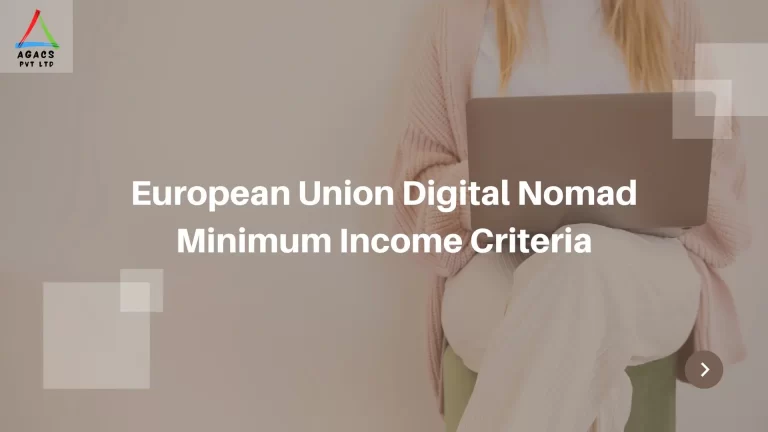Navigating the European Union's Digital Nomad Minimum Income Criteria

How to apply for Europe visa
In an era where remote work is becoming increasingly prevalent, the concept of the digital nomad lifestyle has captured the imagination of many. With the ability to work from anywhere in the world, individuals are embracing the freedom to travel while maintaining their careers. Recognizing this trend, the European Union (EU) has begun to address the needs of digital nomads by introducing minimum income criteria tailored to this unique lifestyle. This article explores the European Union’s digital nomad minimum income criteria, shedding light on its significance and implications for remote workers seeking to reside within EU member states.
Understanding Digital Nomadism:
Before delving into the specifics of the EU’s minimum income criteria, it’s essential to understand the essence of digital nomadism. Digital nomads are individuals who leverage technology to work remotely, allowing them to travel and live in different locations around the world. Their lifestyle is characterized by flexibility, autonomy, and a sense of adventure. However, navigating the legal and financial aspects of this lifestyle can present challenges, particularly when it comes to residency and income requirements.
The Role of Minimum Income Criteria:
Minimum income criteria serve as a cornerstone of the EU’s approach to accommodating digital nomads. These criteria are designed to ensure that remote workers can support themselves financially while residing within EU member states. By setting minimum income thresholds, authorities aim to prevent individuals from becoming reliant on social welfare systems and to promote economic self-sufficiency. Additionally, minimum income criteria help demonstrate the value that digital nomads bring to local economies through their spending and contributions to the workforce.
Variations Across EU Member States:
While the EU provides a framework for digital nomad minimum income criteria, the specific requirements may vary between member states. Factors such as the cost of living, economic conditions, and administrative preferences influence the criteria established by individual countries. Some EU countries may require digital nomads to demonstrate a minimum monthly income, while others may specify an annual income threshold. Furthermore, certain countries may consider alternative forms of income, such as income from investments or freelance work, in addition to traditional employment earnings.
Compliance and Documentation:
Digital nomads seeking to establish residency or long-term visas within EU member states must ensure compliance with the minimum income criteria. This typically involves providing evidence of sufficient income through bank statements, tax returns, or employment contracts. Additionally, digital nomads may need to demonstrate adequate health insurance coverage, a clean criminal record, and proof of accommodation arrangements to meet other residency requirements.
The Future of Digital Nomadism in the EU:
As the digital nomad lifestyle continues to gain traction, it is expected that more EU member states will refine their policies and introduce further incentives to attract remote workers. The EU’s commitment to accommodating digital nomads reflects a broader recognition of the changing nature of work and the importance of flexibility and mobility in today’s globalized economy. By embracing remote work and facilitating the mobility of digital nomads, the European Union stands to benefit from the diverse skills and experiences these individuals bring while enriching local communities and economies.
Conclusion:
The European Union’s digital nomad minimum income criteria represent a significant step towards accommodating the evolving needs of remote workers. By providing clarity and support for digital nomads seeking to reside within EU member states, these criteria contribute to the promotion of economic growth, innovation, and cultural exchange. As the digital nomad lifestyle continues to flourish, it is imperative for policymakers to adapt and refine their policies to harness the full potential of this growing demographic.
FAQ`s:
The purpose of the European Union Digital Nomad Minimum Income Criteria is to establish a baseline income requirement for digital nomads seeking to reside in EU member states.
According to the European Union, a digital nomad is an individual who relies primarily on telecommunications technologies to earn a living and conducts their work remotely, independent of a fixed location.
The minimum income criteria provide a standard benchmark to ensure that digital nomads have a sustainable income that enables them to support themselves while residing in EU member states without becoming a burden on the host country’s social welfare system.
Factors such as the cost of living in the host country, accommodation expenses, healthcare costs, and other essential living expenses are considered in determining the minimum income threshold for digital nomads in the EU.
EU member states may require digital nomads to provide evidence of meeting the minimum income criteria, such as bank statements, contracts with clients or employers, or proof of income from freelance work. Non-compliance may result in denial of residency or other administrative penalties.
Agacs Pvt Ltd is the leading immigration and visa consultancy in Hyderabad, India, offering expert assistance for US H1B Visa, US EB5 Visa, Canada PR and Canada Work permit Visa application processes. Our professional advisors provide trusted guidance to ensure a smooth and successful visa application experience.
For more details on h1b sponsorship contact us at
info@agacs.in & call on +91 9505000900. Website: www.agacs.in


